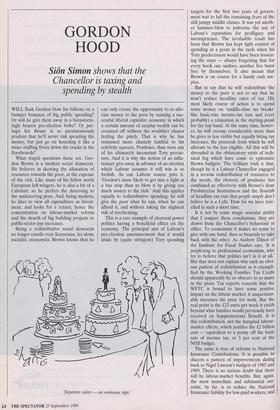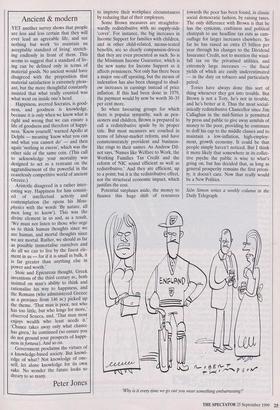GORDON HOOD
Sion Simon shows that the Chancellor is taxing and spending by stealth
WILL flash Gordon blow his billions on a bumper bonanza of big public spending? Or will he give them away in a barnstorm- ingly brazen pre-election bribe? Or per- haps Irn Brune is so parsimoniously prudent that he'll never risk spending the money, but just go on hoarding it like a miser stuffing fivers down the cracks in the floorboards?
What stupid questions these are. Gor- don Brown is a modern social democrat. He believes in skewing the allocation of resources towards the poor, at the expense of the rich. Like many of his fellow north European left-wingers, he is also a bit of a Calvinist, so he prefers the deserving to the undeserving poor. And, being modern, he likes to view all expenditure as invest- ment, and looks for a return; hence the concentration on labour-market reform and the dearth of big building projects or public-sector pay increases.
Being a redistributive social democrat no longer entails even Keynesian, let alone socialist, economics. Brown knows that he can only create the opportunity to re-allo- cate money to the poor by running a suc- cessful liberal capitalist economy in which a certain amount of surplus wealth can be creamed off without the wealthier classes feeling the pinch. That is why he has remained more chastely faithful to his celebrity squeeze, Prudence, than were any of his ultimately inconstant Tory precur- sors. And it is why the notion of an infla- tionary give-away in advance of an election which Labour assumes it will win is so foolish. As one Labour source puts it, `Gordon's more likely to get into a fight at a bus stop than to blow it by giving too much money to the rich.' And this applies equally to redistributive spending: he will give the poor what he can, when he can afford it, and without taking the slightest risk of overheating.
This is a rare example of electoral power politics having a beneficial effect on the economy. The principal aim of Labour's pre-election announcement that it would abide by (quite stringent) Tory spending `Separate cakes — an ominous sign.' targets for the first two years of govern- ment was to lull the remaining fears of the still jumpy middle classes. It was yet anoth- er hammer-blow to pulverise the nut of Labour's reputation for profligacy and incompetence. The invaluable result has been that Brown has kept tight control of spending at a point in the cycle when his Tory predecessors would have been loosen- ing the stays — always forgetting that for every hook one undoes, another five burst free by themselves. It also means that Brown is on course for a handy cash sur- plus.
But to say that he will redistribute the money to the poor is not to say that he won't reduce headline rates of tax. His most likely course of action is to spend some money on 'middle-class tax breaks' like basic-rate income-tax cuts and (very probably) a relaxation in the starting-point for the top band. At the same time, howev- er, he will recoup considerably more than he gives in less visible but equally biting tax increases, the proceeds from which he will allocate to the less eligible. All this will be shrouded in the obfuscatory mists of tech- nical fog which have come to epitomise Brown budgets. The brilliant trick is that, though he is a Labour Chancellor engaged in a serious redistribution of resources to the needy, the rhetoric of prudence has combined so effectively with Brown's dour Presbyterian Scottishness and the flourish of headline tax cuts that people simply don't believe he is a Lefty. How far we have trav- elled in such a short time.
It is not by some magic oracular ability that I conjure these conclusions; they are drawn from the Chancellor's behaviour in office. To economists it makes no sense to give with one hand, then so brazenly to take back with the other. As Andrew Dilnot of the Institute for Fiscal Studies says, 'It is perplexing to professional economists, who try to believe that politics isn't in it at all.' But that does not explain why such an obvi- ous pattern of redistribution as is exempli- fied by the Working Families Tax Credit should apparently be so obscure to so many in the press. Tax experts concede that the WFTC is bound to have some positive impact on the labour market; it unquestion- ably increases the prize for work. But the real point is the £23 extra per week it yields beyond what families would previously have received on Supplementary Benefit. It is this redistribution, not the marginal labour- market effects, which justifies the £2 billion cost — equivalent to a penny off the basic rate of income tax, or 5 per cent of the NHS budget. The same is true of reforms to National Insurance Contributions. It is possible to discern a pattern of improvements dating back to Nigel Lawson's budgets of 1985 and 1989. There is no serious doubt that there will be labour-market benefits. But, again, the most immediate and substantial out- come, by far, is to reduce the National Insurance liability for low-paid workers, and to improve their workplace circumstances by reducing that of their employers.
Some Brown measures are straightfor- wardly redistributive with no supply-side `cover'. For instance, the big increases in Income Support for families with children, and in other child-related, means-tested benefits, are so clearly compassion-driven that they are even presented as such. So is the Minimum Income Guarantee, which is the new name for Income Support as it affects pensioners. Not only has there been a major one-off uprating, but the means of indexation has also been changed to shad- ow increases in earnings instead of price inflation. If this had been done in 1979, the payment would by now be worth 30-35 per cent more.
So when favouring groups for which there is popular sympathy, such as pen- sioners and children, Brown is prepared to call a redistributive spade by its proper title. But most measures are couched in terms of labour-market reform, and have commensurately provident and business- like rings to their names. As Andrew Dil- not says, 'Names like Welfare to Work, the Working Families Tax Credit and the reform of NIC sound efficient as well as redistributive.' And they are efficient, up to a point; but it is the redistributive effect, not the structural economic impact, which justifies the cost.
Potential surpluses aside, the money to finance this huge shift of resources towards the poor has been found, in classic social democratic fashion, by raising taxes. The only difference with Brown is that he has the cynicism, craftiness and political chutzpah to use headline tax cuts as cam- ouflage for larger increases elsewhere. So far he has raised an extra £5 billion per year through his changes to the Dividend Insurance Credit, not to mention the wind- fall tax on the privatised utilities, and extremely large increases — the fiscal yields of which are easily underestimated — in the duty on tobacco and particularly petrol.
Tories have always done this sort of thing whenever they got into trouble. But Brown is not a Tory, he's not in trouble, and he's better at it. Thus the most social- istically redistributive Chancellor since Jim Callaghan in the mid-Sixties is permitted by press and public to give away armfuls of money to the poor, providing he continues to doff his cap to the middle classes and to maintain a low-inflation, high-employ- ment, growth economy. It could be that people simply haven't noticed. But I think it more likely that somewhere in its collec- tive psyche the public is wise to what's going on, but has decided that, as long as general prosperity remains the first priori- ty, it doesn't care. Now that really would be a New Politics.
Sion Simon writes a weekly column in the Daily Telegraph.
`Why is it every time we go out you wear something embarrassing?'



























































































 Previous page
Previous page